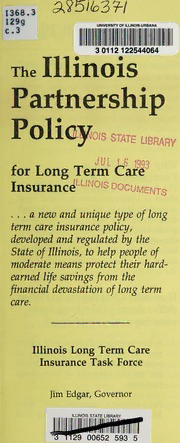
The Illinois partnership policy for long term care insurance PDF
Preview The Illinois partnership policy for long term care insurance
Q,^5llo39-l 1368.3 I29g UNIVERSITY OF ILLINOIS-URBANA C.3 3 0112 122544064 Illinois The Partnership PollOJ^OIS STATE UBRARy JULL6 13S3 ^ for Long Term Care Insuranc ^^’-''"^^'® documents ... a new and unique type of long term care insurance policy, developed and regulated by the State of Illinois, to help people of moderate means protect their hard- earned life savings from the financial devastation of long term care. Illinois Long Term Care Insurance Task Force Jim Edgar, Governor Illinois Partners What is a Partnership Policy? A Partnership Policy is a special long term care insurance policy that meets specific standards established by the State of Illinois. An insurance comply cannot use the Partnership designation imless its policy is approved by the state. Why is it called a Partnership Policy? The Partnership Policy offers a unique blend of insurance coverage and asset protection that is not available through traditional long term care insurance products. These benefits were developed through a public-private partnership between the State of Illinois and the insurance companies approved to sell the policy. How will a Partnership Policy differ from other long term care insurance policies? A A Partnership Policy will allow you to protect all or some of your hard-earned assets depend¬ ing on the amount of insurance you buy. For example, assume you have $50,000 in assets, not coimting your ilip Project for Long Term home and household belongings. If you purchased a Partnership Policy with $50,000 in benefits, you would be able to protect all of your assets. The insurance policy would pay the first $50,000 of your long term care expenses. When the insurance runs out, you would then be eligible for the state's Medicaid Program without spending your personal assets. # On the other hand, if you purchased a policy with $36,500 in benefits, you would have to spend $13,500 of your assets (the difference between your total $50,000 in assets and the amount of insurance) before you could qualify for Medicaid. A A Partnership Policy will allow you greater flexibility in choice of services. Most long term care insurance policies limit services to nursing home care. Others allow some home care benefits, but are usually limited to home nursing services. However, many persons who need long term care can continue to live at home if they have help with shopping and laundry, transportation to medical services, home-delivered meals. Care Insurance and/or supervision during the day when the family is working. The Partnership Policy would allow you to select from a wide range of home and community-based services that could enable you to remain in your own home. And because these alternative programs cost sub- tantially less than nursing home care, you may be able to stretch your insurance benefits over a longer period of time. A A Partnership Policy assures a uniform standard for determin¬ ing eligibility for benefits. With most long term care insurance policies, the insurance company decides when you become eligible for benefits. Eligibility standards can, therefore, vary from one company to another. With a Partnership Policy, the same local agency which determines your eligibility for state- funded long term care services will determine your eligibility for insurance benefits, using the same set of standards for both. This imiformity means that all insurance companies selling Partnership Policies will use the same eligibility standards as the State of Illinois. ir A Partnership Policy can be sold only by trained, agents. Insurance agents who sell a Partnership Policy will be required to complete 12 hours of state- approved training on various aspects of long term care and the unique features of the Partnership Policy. This special training is not required of insurance agents who sell traditional long term care insurance. A A Partnership Policy provides some protection against inflation. With most long term care insurance policies, inflation protection is an optional coverage available for an additional premium. The Partner¬ ship Policy includes a 5% annually compounded inflation protection feature as a basic benefit. Will a Partnership Policy offer the same options available in regular policies? Yes. Each company selling a Partnership Policy will have to provide identical basic benefits, but may offer an assortment of add-on coverages similair to those available through traditional long term care insurance. Examples of the options you can select at an additional cost are higher coverage limits ($100/day versus $75/day) and longer or shorter elimination periods (the time you must pay before the insurance benefits begin). How much will the Partnership Policy cost? As with any long term care insurance, the cost of a Partnership Policy will vary depending on your age and the package of benefits you select. Although the state will mandate the basic benefits that must be included in a Partnership Policy, the state will not set the price that companies may charge. However, indications are that the Partnership Policy will be affordable and competitively priced. Illinois Department on Aging 421 East Capitol Avenue Springfield, IL 62701 Senior HelpLine 1 800 252-8966 - - (Voice and TDD) Illinois Bell Relay Number for the hearing impaired: 800-526-0844 The llfinois Department on Aging does not discriminate in admission to programs or freatment of employment in programs or activibes in compliance with tie Illinois Human Rights Act; the U.S. Civil Rights Act Secbon 504 of the Rehabilitalion Act the Americans wi^ Disabilibes Act of 1990; the Age Disctiminabon Act: tie Age Discriminaton in Employment Act and tie U.S. and Illinois Consbiutons. If you feel you have been disaiminated against, you have a right to file a complaint with tie llinois Department on Aging, for informabon, call Senior Helpline: 1-800-252-8966 (voice and TDD). Printed by Authaity State of llinois Illinois Deparbnent on Aging 2.000 7/93
